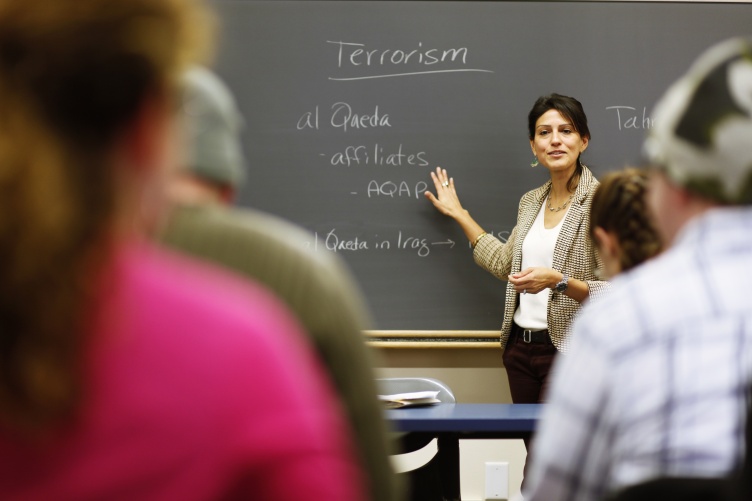
In a recent interview with World Politics Review, Politics & Society Professor Melinda Negrón-Gonzales discussed women's rights and gender equality in Turkey. The interview is part of an ongoing series examining gender equality in countries across the globe.
Read the full interview below:
World Politics Review: What is the current status of women's rights and gender equality in Turkey, in terms of level of education, participation in the economy, representation in government, etc.?
Melinda Negrón-Gonzales: Generally, Turkey lags behind its European peers but is ahead of its Middle Eastern neighbors. Turkey ranked 130th out of 144 countries in the World Economic Forum’s 2016 global gender equality report—only slightly above neighboring Iran. The United Nations Global Database on Violence Against Women reports that 38 percent of women in Turkey have experienced abuse by a male intimate partner, and labor force participation is about 30 percent according to the Turkish Statistical Institute.
However, there are some bright spots. The number of women in parliament is at an all-time high of about 17 percent; and Turkey has made considerable progress in education, almost achieving gender parity in education of children. There more girls in school today than ever before and there are also more females attending Turkish universities. In addition, many pious women feel empowered by the religious conservative Justice & Development Party (Ak ve Kalkinma Partisi/AKP) which has addressed issues that are salient for them, particularly by finally lifting Turkey’s headscarf ban which outlawed headscarves in public buildings (e.g. universities, government offices, etc.).
On balance, there has been improvement in some areas, while others clearly have gotten worse. For instance, according to Turkey’s Ministry of Justice, fourteen times as many women were murdered in 2010 than in 2003. Moreover, violence against women appears to be on the rise. A persistent problem is Turkey’s culture of impunity for perpetrators of violence against women—a phenomenon that pre-dates the AKP but which appears to have intensified in recent years.
WPR: How politically prominent are the issues of gender equality and women’s rights in Turkey?
MNG: The religious conservative AKP has never been a champion of women’s rights, but has been responsive, to varying degrees, to pressure and public opinion. Indeed, the AKP enacted historic pro-women legislation during its first and second terms as a result of intense pressure from women’s groups and the European Union (EU). Because AKP officials are not inclined to prioritize women’s issues or to interpret women’s issues in terms of individual rights, it is largely up to opposition parties and civil society organizations to apply constant pressure, particularly now that the European Union accession process has all but disappeared. As EU influence continues to wane, it is more difficult for women’s groups to promote legislation and monitor implementation of gender reforms.
Nevertheless, Turkey has a robust women’s movement, and activists, academics and parliamentarians from opposition parties continue to work tirelessly to promote gender reform. For example, gender equality is a core value of the pro-Kurdish People’s Democratic Party (Halkların Demokratik Partisi/HDP), and it was the first party in the Muslim world to introduce an internal 50 percent gender quota. Furthermore, activists, often joined by politicians from opposition parties, regularly hold public demonstrations to raise awareness and express disapproval of government initiatives.
WPR: What social and political barriers stand in the way of women’s rights, and what steps has the government taken to address violence against women and gender inequality?
MNG: It’s important to keep in mind that Turkey was never a bastion of gender equality, even under secular governments. It is also important to note that the barriers to gender equality and the chasm between religious conservatives and secularists in Turkey mirrors non-Muslim democratizing countries where long-standing patriarchal traditions clash with modern conceptions of individual rights.
The AKP’s early reforms notwithstanding, the party has indeed served as one of the main barriers to gender equality in the past decade, backpedaling on some of the historic reforms passed during its earlier terms. It promotes a family-based approach to women’s issues, which exalts motherhood as women’s primary role in society. Accordingly, although it has the requisite power and resources, the AKP has not fulfilled its promise to significantly increase the number of shelters for women facing abuse, nor has it adequately eliminated barriers to female participation in the labor force or in politics. In fact, President Erdogan publicly called for women to have at least three children, and publicly stated that he does not believe in the feminist notion of gender equality. Unsurprisingly, his party has erected institutional barriers to gender equality to ensure that a family-based approach dominates. For example, in 2012 the Ministry of Women and Family was reorganized as the Ministry of Family and Social Policy, thereby subsuming women’s issues under family policies.
The most significant barrier to gender equality in the long term is the preponderance of traditional gender norms. As in all countries, achieving gender equality requires convincing not only males but also females that traditional gender norms are problematic; and changing the minds of tens of millions of citizens has always been harder than changing legislation.
















































